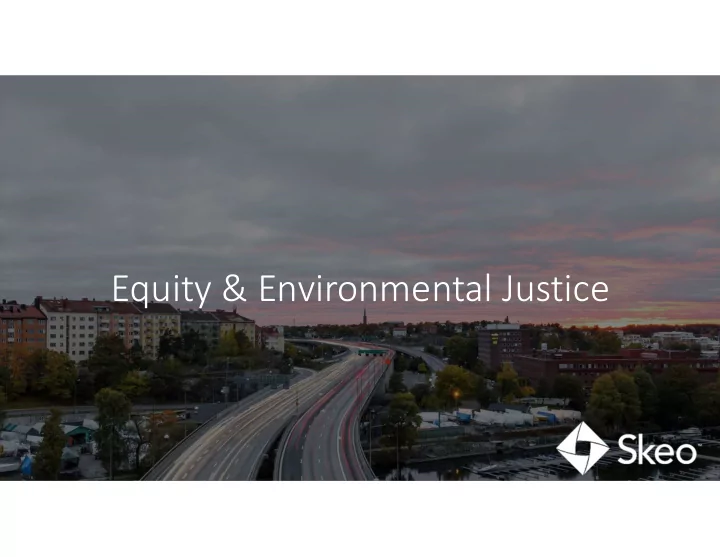

Equity & Environmental Justice
Welcome Matt Robbie Vernice Miller-Travis Aaron Mair Senior Planner and Facilitator Senior Advisor for Environmental Sierra Club | Arbor Hill Justice and Equitable Development Skeo Solutions Environmental Justice Corporation Skeo Solutions 2
Overview Equity, environmental justice and brownfield redevelopment Arbor Hill Perspective Process tools for building productive community relationships 3
Universal protection from activities that threaten the fundamental right to What is clean air, land, food and water. Environmental Justice? Environmental justice refers to those cultural norms and values, rules, regulations, behaviors, policies, and decisions to support sustainable communities where people can interact with confidence that their environment is safe, nurturing, and productive. Dr. Bunyon Bryant, retired director of Environmental Advocacy at the Univ. Of Michigan School of Natural Resources and the Environment 4
Environmental INJUSTICE can occur when environmentally detrimental infrastructure or locally unwanted land uses occur in close proximity to people of color, low-income, or tribal communities. 5
What is Equitable Development? Equitable development ensures that current residents benefit from development and have a meaningful role in the planning process. 6
Why Do Disparities Exist Today? Present day disparities and inequities are the result of public policy decisions. Some are: • Intentionally discriminatory and target low income, people of color, tribal and immigrant communities. • Neutral or benignly intentioned initiatives that positively impact some communities and negatively impact others. 7
Recap Equitable development ensures current residents benefit from development and have a meaningful role in the planning process to prioritize and pursue projects that contribute to neighborhood resilience and improved quality-of- life. Public policies have created inequitable outcomes for some communities and have resulted in unsustainable regional development patterns. Using an equitable development approach acknowledges the root causes of inequitable and unsustainable development and strengthens the long-term viability and sustainability of a planning or development project. 8
Building Productive Community Relationships 9
Q Have you ever had challenges engaging with a community different from your own culture on a project? Yes No 10
Q If so, what have been the barriers? Limited community participation in planning efforts Cultural differences Community distrust Meetings characterized by anger and misunderstanding Some combination of the above 11
We need to move from… Community Collaborative One-way Empowerment Community Partnerships Engagement Adapted from International Association of Public Participation (IAP2) 12
Listen to community needs • Design an open and inclusive meeting. • Ask many, many questions! And Listen. • Affirm that conditions are often unique to a particular place, history and experience . 13
Start a new conversation Begin conversations by acknowledging “the elephant in the room:” • planning fatigue • historic conflicts • cultural differences • present-day inequities 14
Trust-Building Strategies Ask for and incorporate feedback. Provide opportunities to impact decision-making. Be up front about decisions that have already been made. Learn about community dynamics and history. Seek out tools that address differences. Build authentic personal relationships. Ask for feedback! 15
Recap Building productive community relationships depends on believing that community residents’ thoughts, feelings and expertise are vital to your work. Invite community residents to the table by using culturally-appropriate outreach. Identify and acknowledge the elephant in the room when there is distrust between a community and local decision-makers. 16
Small Group Exercise + Discussion 17
Thank you! Vernice Miller-Travis 301.537.2115 vmiller-travis@skeo.com Matt Robbie 802.231.3132 mrobbie@skeo.com www.skeo.com 18
Recommend
More recommend